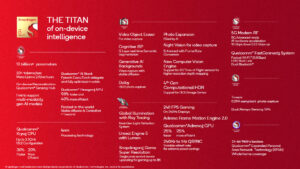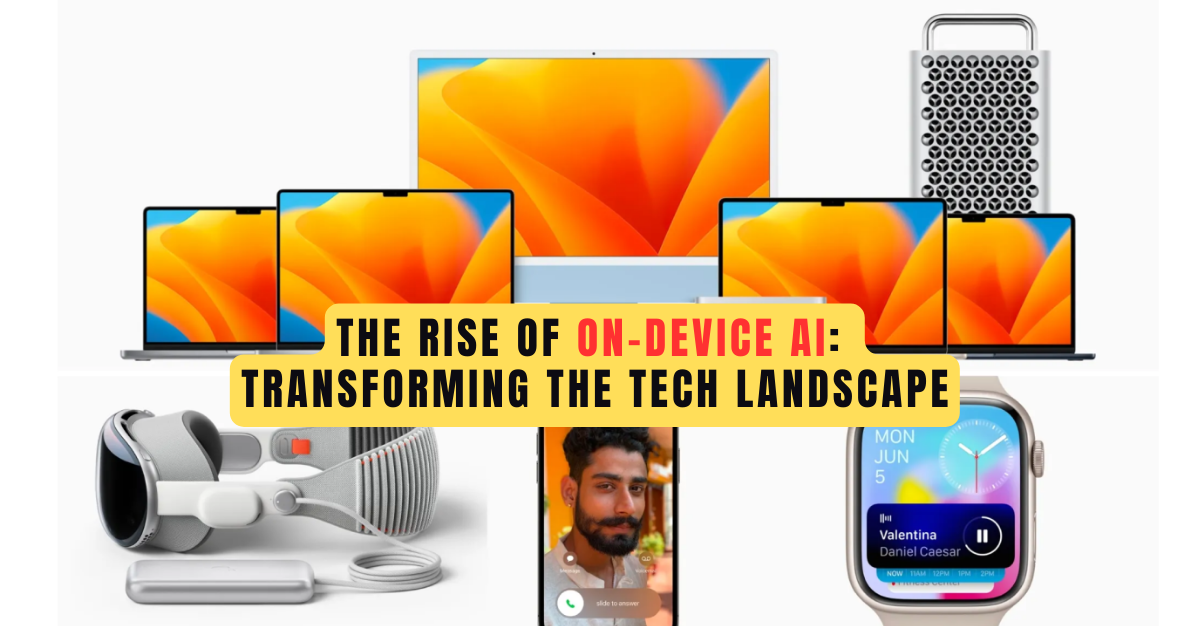On-device AI: In the ever-evolving realm of artificial intelligence (AI), a groundbreaking trend is taking center stage, poised to revolutionize the industry as we know it. On-device AI, specifically tailored for smart gadgets like smartphones, laptops, and self-driving cars, is gaining momentum. Chipmakers are on a mission to craft AI-enabled memory chips that cater to the unique needs of consumer electronics manufacturers. This transformative technology not only provides customized and personalized functions but also boasts enhanced security, cost-effectiveness, and reduced power consumption compared to traditional generative AI.
Contents
Apple’s Generative AI
Apple is overhauling its AI capabilities with Generative AI, focusing on revamping Siri, Search, Apple Music, and other apps. The tech giant aims to enhance user experiences by integrating advanced AI technologies. This comprehensive update underscores Apple’s commitment to staying at the forefront of AI innovation. The revamp signifies a crucial step towards delivering more personalized and efficient services to users. The move aligns with the industry’s growing reliance on AI.


Tech Giants Invest Heavily
Major players in the tech industry, including Apple, Samsung Electronics, Qualcomm Inc., Intel Corp., and AMD, are channeling substantial investments into the development of on-device AI. Samsung, renowned for its cutting-edge memory chips and smartphones, is gearing up to incorporate AI features, such as text-to-image conversion, into its highly anticipated Galaxy S24 series.
| Company | AI Product/Initiative |
|---|---|
| Samsung Electronics | Galaxy S24 with AI features |
| Qualcomm Inc. | Snapdragon 8th Gen 3 for on-device AI |
| Intel Corp. | Upcoming “Meteor Lake” CPU for PCs |
Google, too, has stepped into the arena with the Pixel 8 smartphone, promising users a more helpful and personalized experience through its AI-centric design. Meanwhile, Apple has unveiled advanced central processing units (CPUs) for MacBook laptops, ushering in faster AI and machine learning workflows.


Beyond Smartphones and Laptops
The potential of on-device AI extends far beyond smartphones and laptops. Companies like Samsung, LG Electronics, and AMD are venturing into the AI-enabled laptop market, with research firm Counterpoint predicting significant growth in this sector. Moreover, Samsung and Apple are reportedly exploring the prospect of offering on-device AI services for smartphones through subscription plans, aiming to establish stable income streams.
“On-device AI marks a pivotal shift, empowering gadgets to deliver personalized experiences securely. The future of tech is about to unfold.” – Tech Enthusiast
The allure of on-device AI lies in its cost-effectiveness and privacy protection. By processing AI data locally, on-device AI minimizes the need for extensive data transfers to external centers. This not only saves costs but also addresses privacy concerns associated with cloud-based generative AI models. Furthermore, on-device AI holds the potential to deliver highly personalized services by analyzing users’ voice patterns, expressions, reactions, and even their health conditions.
Apple’s ARM tech lead faces a challenge as Qualcomm’s Snapdragon 8 Gen3 chip brings superior AI with on-device processing, supporting LLM, LVM, and the worlds fastest stable diffusion for image generation,This breakthrough brings a new era of enhanced on device intelligence. pic.twitter.com/SlP480hFV3
— Hadi & Co (@hadi__co) November 15, 2023
Strategic Moves by Industry Leaders
The soaring demand for on-device generative AI has prompted industry leaders to make strategic moves. Samsung and Qualcomm, for example, are rolling out integrated chipsets that combine the neural processing unit (NPU) with other essential chips for AI functions. This integration facilitates seamless data processing and the implementation of AI capabilities. Notably, Samsung’s Exynos 2400 application processor (AP) and Qualcomm’s Snapdragon 8th Gen 3 mobile processor are specifically designed for on-device AI.

While the impact of on-device AI on smartphones and laptops is increasingly evident, it is expected to extend its influence to the personal computer (PC) market. Intel, a stalwart in the industry, is gearing up to introduce the “Meteor Lake” CPU, supporting AI functionalities in PCs. Intel’s CEO, Pat Gelsinger, views this as an inflection point in the PC industry, signaling that on-device AI is poised to revolutionize the way we interact with our computers.
In conclusion, on-device AI stands as a transformative force, reshaping the AI landscape by providing personalized and secure experiences while mitigating the challenges posed by generative AI. As tech giants continue to pour investments into this burgeoning field, the future of smart gadgets, from smartphones to laptops and PCs, appears promising as on-device AI continues to elevate our digital interactions.
FAQ
What is on-device AI?
On-device AI refers to artificial intelligence technology specifically designed for smart gadgets, allowing for customized and personalized functions with higher security, lower costs, and reduced power consumption compared to cloud-based generative AI models.
How does on-device AI differ from generative AI?
While generative AI relies on cloud-based models that involve extensive data transfers, on-device AI processes AI data locally. This not only reduces costs and power consumption but also addresses privacy concerns associated with data transfers to external data centers.
Which companies are leading the development of on-device AI?
Major tech companies such as Samsung Electronics, Qualcomm Inc., Intel Corp., and AMD are at the forefront of developing on-device AI technologies. These companies are investing heavily to meet the increasing demand for AI-enabled memory chips in consumer electronics.
What are the potential applications of on-device AI?
On-device AI has diverse applications, ranging from smartphones and laptops to autonomous-driving cars and personal computers. It enables personalized and tailored services by analyzing user characteristics such as voice patterns, expressions, reactions, and health conditions.
How will on-device AI impact the PC market?
On-device AI is expected to reshape the PC market as well. Companies like Intel are introducing CPUs that support AI functionalities in PCs, heralding a new era in the way we interact with computers. This development is predicted to bring about significant changes and advancements in PC technology.
